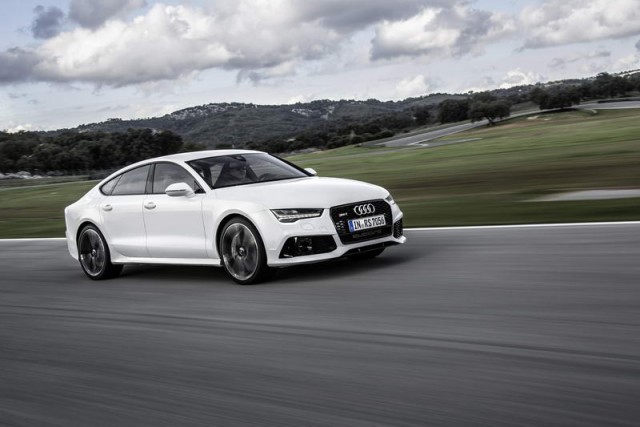Overall rating: 4/5
From a box-ticking standpoint, the updated Audi RS 7 Sportback is pretty much a full house. Its looks are relatively understated, it has the kind of interior finish that makes the huge price tag somewhat justifiable and of course the performance isn't what you'd call lacking. That said, it's not quite perfect.

In the metal 4/5
We reckon that the range-topping Audi RS 7 Sportback doesn't quite look as refined as the lesser-powered S7, or even the standard A7 in S line guise. The enlarged air intakes dominate each corner of the front bumper and incorporate detailed inlets that are finished in a contrasting aluminium-look paint. The signature Audi trapezoidal grille is annotated by an RS 7 badge and there's a huge quattro logo running across its bottom - in case you needed reminding. Front-on it's all a bit brash really.

Moving back along the car the rest of the styling is rather demure in comparison to the front. There should be boldly-flared wheel arches and bulging sills, but there aren't. In fact the RS 7's track is 10mm narrower front and rear in comparison to a standard A7. Even so, those wheel arches are well filled with unique 20-inch wheels, and behind those are beefy ventilated brake discs. If you're feeling flush you can upgrade to carbon-ceramic discs for a 'mere' €13,250. They'll increase the stopping power and last longer on track but if you're just going to be driving on the road they're a bit of a waste of money. The aluminium-look door mirror caps can be specified to be simply body-coloured - something we would recommend - while the beautifully-sloped rear is rounded off by a modest diffuser and two large oval exhausts.

The interior is undoubtedly one of the finer points of the RS 7 Sportback. Fit and finish is on a par with any luxury car on the market and every touch point feels solid and thoroughly crafted. Its heavily bolstered seats are supportive and even over a longer drive remain soft enough to still provide adequate levels of comfort.
Driving it 3.5/5
On the road, the RS 7 soon shows its Jekyll and Hyde-like performance. At slow speeds around town the 560hp saloon is every bit as docile as its much lesser-powered brethren and in its standard driving mode is reasonably supple over lumps and bumps despite the fitment of 20-inch alloy wheels as standard. The steering is lighter than you would expect and although this can be weighted up by switching the Drive Select system to Dynamic mode, it still feels a touch too light for those who like a more natural feel through the wheel.

Power is what the RS 7 is all about and it has this in abundance. The 4.0-litre TFSI engine lacks the roar of the 5.0-litre V10 TFSI that graced the previous RS6, and it is this more subtle engine note that adds to the deceptively fast nature of the RS 7. In Dynamic mode - and using the gearbox manually to shift - there's an addictive amount of popping and cracking through the exhaust on the overrun. Delivery of that power is near instantaneous in almost any gear and on an open road the speedometer can sometimes struggle to keep up such is the rate at which speed increases. This is all the more impressive when you take a moment to remember that this is still a 2,540kg saloon.
It isn't without its faults though. In a straight line drag race it is phenomenally rapid, but point-to-point over a twisting road cracks do start to appear in the RS 7's performance armoury. The all-wheel drive has a slight rear bias and does feel very surefooted most of the time, but it is still prone to understeering a little too much when you push the car hard into a tight bend. This isn't helped by the lifeless steering.

Driving it in Dynamic mode should give drivers the most rewarding experience on a race circuit but on the road the adaptive suspension is so firmly sprung that it can be jarring and in one instance during our test drive it developed a serious oscillation throughout the suspension that was only stopped by switching the suspension to Comfort in the Individual section of Drive Select.
What you get for your money 4/5
The RS 7 won't leave buyers wanting for much in terms of specification. Standard features include a flat-bottomed and electrically adjustable leather steering wheel, MMI navigation with touchpad, 'parking system plus' and a head-up display to name just some of what you get inside.
Worth Noting
Of its competition, the RS 7 is a relative bargain to buy, coming in €17,190 less than its nearest rival on price, the Mercedes-Benz CLS 63 AMG. The BMW M6 Gran Coupé is a closer competitor to the RS 7 than the M5 saloon, though it is still a €35,860 jump up from the Audi's base price, while Porsche's Panamera Turbo S is an eye-watering €94,596 more expensive. One other point worth mentioning is that of all these cars the RS 7 is the only car to fall into road tax Band F, meaning it costs €1,200 per year to tax rather than €2,350 for those in Band G.
Summary
If you can call a 560hp saloon sensible then the Audi RS 7 Sportback is just that. It doesn't have the sweet handling of the BMW M6 Gran Coupé through bends, but for those looking for a range-topping car that needs to deliver occasional rapid bursts of performance, the Audi does make for a good all-round package.















